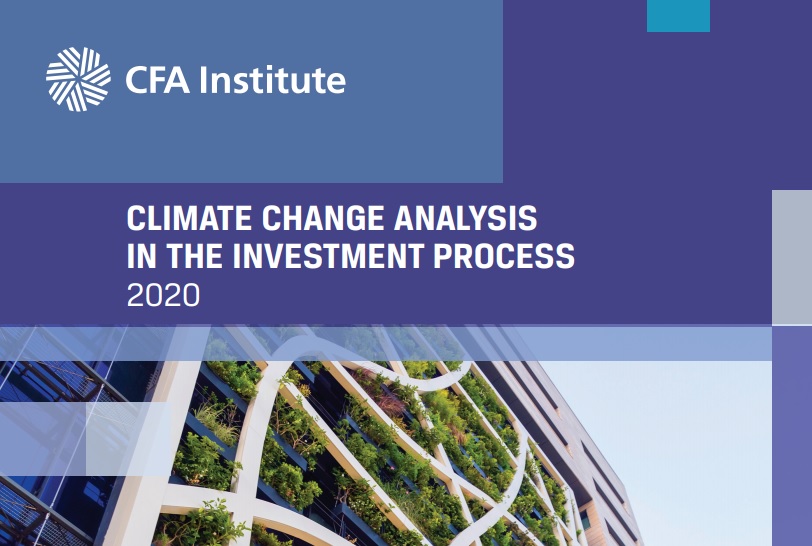CFA Institute: Climate change analysis in the investment process
CFA Institute: Climate change analysis in the investment process

CFA Institute, the global association of investment professionals, has released a report on climate change analysis, a resource to help guide investors towards including climate change analysis in the investment process.
The report, Climate Change Analysis in the Investment Process, includes an examination of the issue of climate change, discusses the physical and transition risks brought about by climate change, explores carbon markets, and presents current resources and best analysis practices available to investors concerning climate change.
The report also includes a survey of CFA Institute members concerning climate change. In the results, about 75 percent of global C-level executives in the investment industry surveyed believe that climate change is an important issue, but only about 40 percent of all survey respondents incorporate climate change information into their investment process. The report also contains 10 case studies from global investment management firms demonstrating how they fit climate change into the investment process. Theses case studies cover a diverse set of investment themes, such as carbon markets, quantitative analysis, engagement around climate issues, and forestry as an asset, for example.
“The role of finance is to allocate capital efficiently in society. That process is increasingly taking the impact of climate change into account. Financial professionals need to be equipped with the best tools and training around climate change analysis in order to make investment decisions that take climate change into consideration,” said Margaret Franklin, CFA, President and CEO of CFA Institute. “This report will be a resource to investors and financial professionals in that process.”
The report includes recommendations CFA Institute makes to investors and policymakers to better integrate climate change analysis into what they do, such as:
- A price on carbon: CFA Institute calls on policymakers to ensure that regulatory frameworks for carbon markets are designed to deliver transparency, liquidity, ease of access for global market participants, and similar standards across jurisdictions, in order to underpin robust and reliable carbon pricing.
- Carbon price expectations included in analyst reports: CFA Institute recommends that investment professionals account for carbon prices and their expectations thereof in climate risk analysis.
- Increased transparency and disclosure on climate metrics: CFA Institute notes that the investment industry is coalescing around the Sustainability Accounting Standards Board (SASB) and Task Force on Climate-related Financial Disclosures (TCFD) standards for climate-related disclosures, which are the most relevant and succinct climate-related disclosure standards for addressing the materiality of climate-related risks.
- Engagement with companies on physical and transition risks of climate change: CFA Institute asserts that investors should engage with issuers to ensure that climate data, scenario analysis, and related disclosures are sufficiently thorough to support robust climate risk analysis in the investment process.
- Education within the investment management profession: Investors need to continue to educate themselves about climate change in order to provide clients with the climate- related analysis they require.
- Policymakers: Investors need to continue to urge policymakers to craft regulations to ensure that investors have the tools they need to do the work of finance — that is, the efficient allocation of capital that helps to tackle the existential threat of climate change.
Please click below to read the full report:
